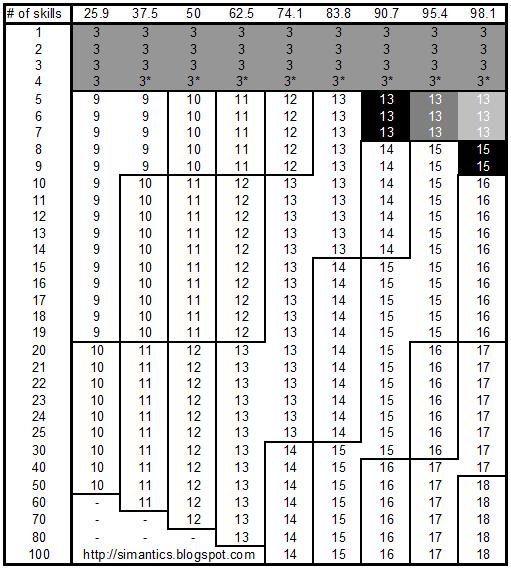DX has the same point costs and levels as IQ, but the related skills are priced differently. Skills are only easy, average, or hard. An easy skill costs 1 point to buy at the same level as the character's DX, an average skill costs 2, and a hard skill costs 4. Lower levels can be bought for half the price as the next higher level, down to .5 points (so .5 points will buy a hard skill at the DX-3 level). Higher levels cost twice as much as the previous level until the cost is 16 points (e.g.: average skill at the DX+3 level), then each level costs 8 more points than the previous level did. Buying hard skills above one's DX score is very expensive indeed.
Here is a graph showing the probabilities of success with average DX skills by cost and DX score:
I also created a table that you can use to easily see what DX to buy after you decide how many average DX skills (or equivalent) you want and how often you want to be successful using them (success probabilities below 25% are not shown):
*Though an DX of 3 is technically optimal in these cells, a score up to 9 may be a better choice because the point cost difference is very small and DX will have impacts on game play beyond the cost of skills.
You can see that this table is much easier to use than the IQ table. The multipliers to convert easy and hard skills to average skill equivalents do not change (they change for some inefficient arrangements, but not for any optimal arrangements). For all white cells: easy skills count as .5 average skills, and hard skills count as 2 average skills. For the grey cells, the multipliers vary, but are irrelevant.
Similarly to the IQ table, we see that a score of 13 is great if you want your character to be pretty consistently successful at a good handful of skills. A below average (10) DX score is only appropriate if you want your character to never be effective at more than a single DX skill. Min-maxers may be tempted to trash a stat to get points to spend on the other, but I would be hard-pressed to think up a character (okay, besides a Professor Xavier type) that would be better off with a low DX. In fact, it seems that most characters should have both a DX and an IQ of at least 13, and would not be significantly sacrificing uniqueness or wasting points.
A nit-picker may point out that many skills have default values (e.g.: DX-6), so characters technically have lots of skills for free. The default values are such that even with a DX of 15, the character may have a 50% chance of success with an average skill. A DX of 17 only gives about a 75% chance of success. High enough DX or IQ scores to make default skill levels reliable are so expensive that a character will have significant opportunity costs for other features that were passed up. The term "Jack of all trades, master of none" comes to mind. It is generally more effective and efficient to be a specialist, and spend the points on actually having the skills you think will be useful for you.



